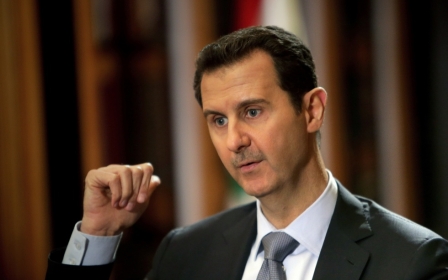Opposition decries 'blood elections' in Syria, as government hails 'national victory'

Reaction to the presidential election taking place in Syria has reinforced domestic and international divisions, with the opposition and their international backers decrying it as a “farce” while Bashar al-Assad and his allies have said it shows he is defeating “terrorists”.
President Assad is facing two virtually unknown opponents in the election, MP for Aleppo Maher Hajjar and ex-minister Hassan al-Nouri, as voting only takes place in government controlled areas of the country. There is no voting in roughly 60 percent of the country held by rebel groups.
Opposition figures, who are boycotting the vote and have been disqualified from standing due to restrictions on residency requirements, have described the vote as a “blood election”.
“It [the election] will provide Assad with a façade of legitimacy that he and his patrons in Moscow and Tehran will attempt to exploit on the world stage,” Ahmed Jarba, president of the Syrian Opposition Coalition, wrote today in the Washington Post. “And, most devastatingly, it will give Assad pretence to claim a mandate to accelerate the slaughter and destruction of the Syrian people.”
International backers of the Syrian opposition have also voiced their criticism of the vote, with the head of NATO describing the process a “farce”.
The vote “does not fulfil international standards for free, fair and transparent elections and I am sure no [NATO] ally will recognise the outcome of these so-called elections,” Anders Fogh Rasmussen told a press conference in Brussels.
French Foreign Minister Laurent Fabius said it was a “fake” election and would do nothing to bring an end to a three year long civil war that has killed over 162,000 people.
“In this election the choice was between Bashar and Bashar,” Fabius told reporters. “This fake election will serve to justify Bashar al-Assad’s ability to continue the type of policies we all recognise, which are a merciless fight [against the opposition] and keeping himself in power.”
Syrian government officials, however, defended the elections as a “big national victory” and said it marks the beginning of a new phase for the country.
“Today the Syrians are voting to record their free will in transparent democratic plural elections,” Foreign Minister Waled al-Muallem told state news agency SANA. “They are shaping their future and electing their leader in absolute freedom and transparency.”
Presidential candidate Hassan al-Nouri praised the election while casting his vote at the Sheraton Hotel in the capital Damascus.
“We started a new phase of countering terrorism and the global war on Syria by the will of the Syrian people and heroic sacrifices of its army,” Nouri told reporters. “Syria after the elections is a new and democratic political pluralistic country.”
Allies of the Assad government have added their support with Iran, Russia, North Korea, Zimbabwe and Tajikstan sending monitors to observe the elections.
“Our primary objective on the day of the vote is to control compliance with international standards of voting rights in Syria,” Igor Morozov, Russian Federation Council member, told the Voice of Russia. “Syria is an outpost of statehood in the fight against armed revolts.”
Analysts have said the election reflects the government’s increasing confidence of defeating rebel groups but that the Syrian people continue to suffer the effects of a brutal civil war.
“This is a political exercise to showcase the Syrian regime’s ability to muster a large turnout and to demonstrate both its loyal and coerced following amongst Syrians in areas under its control,” Chris Doyle, director of the Council for Arab-British Understanding, told MEE. “But the hard reality, that cannot be overstated, is that the conflict continues apace and Syrians are not one inch closer to any resolution of this disaster.”
“The bombs will keep on falling long after the ballot boxes have been put away.”
While voters cast their votes in Damascus on Tuesday explosions could be heard across the capital as opposition fighters fired motors into government controlled areas, with the air force striking rebel held zones in response.
There was strong condemnation of the vote on social media, while supporters of Assad shared photos of the president casting his vote in Damascus.
Stay informed with MEE's newsletters
Sign up to get the latest alerts, insights and analysis, starting with Turkey Unpacked
Middle East Eye delivers independent and unrivalled coverage and analysis of the Middle East, North Africa and beyond. To learn more about republishing this content and the associated fees, please fill out this form. More about MEE can be found here.




